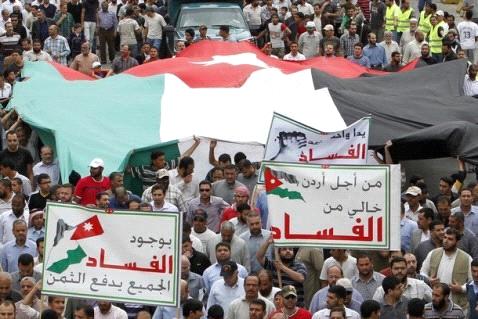Ammon News - AMMONNEWS - As Jordanians celebrated their country’s independence from Britain 66 years ago this week, thousands of citizens came out to participate in the festivities. It was a shift from the more familiar scenes of strikes and protests, most recently over price increases imposed by the government.
The situation in Jordan, a monarchy, is more subtle than in some other countries. While there have been numerous protests, the political temperature has yet to reach anywhere near the levels that it did in Tunisia, Egypt and Libya, whose regimes were ousted.
Jordanians seem to have a more focused approach toward surging prices of basic commodities, along with that of fuel and electricity. Labor unions are becoming an increasingly potent force, calling attention to bad work conditions and low income.
Jordan may have an image as a glamorous kingdom, but it is in reality a relatively poor country with almost 14 percent of its population living below the poverty line. Like other countries in the Middle East, it has high unemployment, particularly among the young.
While Jordan’s overall unemployment rate is 12 percent, according to the department of statistics, the rate among young people under 30 is more than double that. Nearly 70 percent of the population is under the age of 30.
“I think the economic situation in Jordan will eventually make it a very hot summer,” said Labib Kamhawi, a political analyst. “People will take to the streets because of issues related to their livelihoods and unemployment if they are not seriously addressed.”
The government may be trapped. Its main tool for soothing discontent comes in subsidies for commodities and services, but this year’s budget deficit is projected to be a record of about $3 billion. So the government has responded by raising prices: 25 percent for high-octane gasoline, increases on other fuels, and higher electricity prices for businesses such as banks and hotels. Some corporate tax rates are also expected to go up.
Jafar Hassan, minister of planning and international cooperation, warned in an interview this week that the country must act soon to confront its economic problems. “We are going through challenging times that need comprehensive economic strategies and solutions in the short term but also in the long term,” he said.
Despite the discontent, most protests in Jordan remain small and scattered, signaling a weak and divided opposition. Occasionally, more severe expressions of dissent emerge, including scathing columns or cartoons, self-immolations, or chants that attack high-level corruption, a long-running grievance among many Jordanians.
“People feel they are not responsible for the current state of affairs,” said Mr. Kamhawi, the political analyst. “They are asking for serious steps to be taken to retrieve public money that was stolen by corrupt people, and they don’t feel obliged to pay for the mistakes of the government.”
A day after the government announced the price increases, a relatively unknown group, Ask for Your Rights, organized a rally in the capital. Only a dozen or so people showed up.
That evening, in the northern city of Irbid, a rally attracted nearly 100 people who held signs denouncing the rising cost of living.
Unlike these small protests, labor strikes have been better organized and more effective. Since the Arab revolutions swept the region and an amendment to a Public Gathering Law eased restrictions on the organization of rallies and protests, teachers, laborers, engineers, journalists and doctors have demanded better working conditions and health benefits. Teachers in Jordan held the largest, most persistent and successful labor strike in recent history and succeeded in raising pay and improving working conditions.
“Unlike political protests and parties that lack unity or a voice that represents Jordanians, the labor strikes have focused on demands that improve their livelihoods,” said Bassam Haddadin, a member of Parliament. “They come with a list of specific demands and they have largely succeeded.”
This all comes amid the musical chairs of governments over the past year and a half. King Abdullah II appointed a new government nearly a month ago, led by Fayez Tarawneh, a former prime minister and royal court chief during the late 1990s.
The king asked Mr. Tarawneh, 64, to form a government to pave the way for parliamentary elections before year-end.
His predecessor was Awn Khasawneh, 62, an International Court of Justice judge who formed his cabinet last October to become the third prime minister of the year 2011.
In a letter of dismissal, King Abdullah criticized Mr. Khasawneh’s progress on change and insisted that it was essential to hold parliamentary and municipal elections by the end of the year.
“During the past months,” the king wrote, “I have followed the work of the government in various fields, hoping the government would be more efficient and active in finalizing these laws, in cooperation with the lower house, but a slow pace continued to prevail.”
Abdullah, who became king in 1999, and his father, the late King Hussein, tried to appear to be above the political fray, dismissing prime ministers and governments to signal change. But that tactic is wearing on a more sophisticated public.
“The heightened number of governments reflects a failed political system, and the current prime minister belongs to the past,” said Mr. Kamhawi, the political analyst. “He is very conservative and he doesn’t hide that. I don’t think he is a reformer.”
Still, when they look across the region, Jordanians shudder at what they see, especially in Syria. And that prospect may help preserve at least a modicum of stability.
“The first months of the Arab Spring inspired Jordanians to take to the streets to also demand their rights, but the chaos in Syria and Egypt changed this,” said Mr. Haddadin, the lawmaker. “Now Jordanians count to 10 before deciding to take any action or demand how much change they want to see. We don’t want chaos or destruction.”
* The New York Times








 comment replay
comment replay 